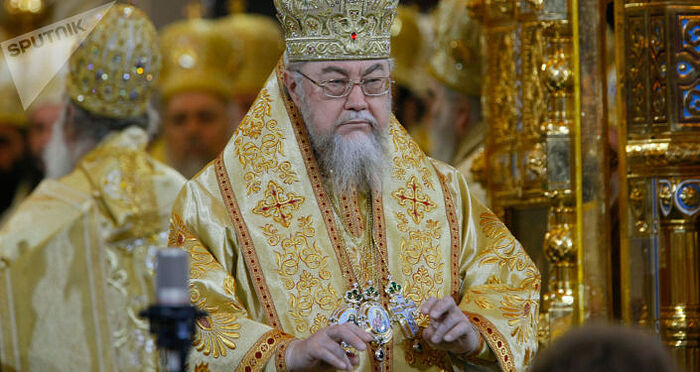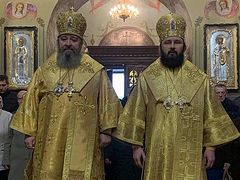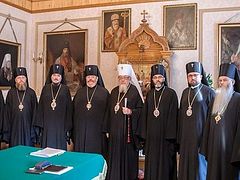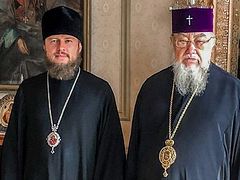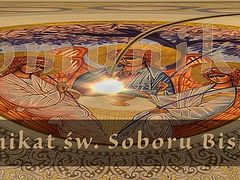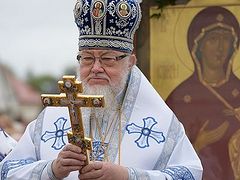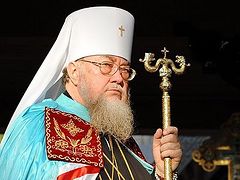His Beatitude Metropolitan Sawa of Warsaw and All Poland and the entire episcopate of the Polish Orthodox Church have shown themselves to be among the most ardent supporters of His Beatitude Metropolitan Onuphry of Kiev and All Ukraine and the canonical Ukrainian Orthodox Church as the autocephaly crisis led by the Patriarchate of Constantinople continues to unfold.
In May 2018, the Synod of the Polish Church stressed the need for repentance from the Ukrainian schismatics before admitting them back into the Church and for a pan-Orthodox discussion on the provision of autocephaly; in late September 2018, Met. Sawa personally renewed the call for Pat. Bartholomew to convene a pan-Orthodox council to resolve the Ukrainian crisis; on November 16, 2018, the Bishops’ Council of the Polish Church forbade its clergy from having liturgical or prayerful communion with the Ukrainian schismatics; Met. Sawa wrote a personal letter of support to Met. Onuphry in mid-December 2018 following the scandalous “unification council,” which, in the eyes of Constantinople, removed Met. Onuphry as the canonical Metropolitan of Kiev; in January 2019, Met. Sawa specifically rejected Pat. Bartholomew's request that he recognize the new Ukrainian structure and commemorate its primate, “Metropolitan” Epiphany Dumenko, at the Divine Liturgy; and in October 2019, the Polish Bishops’ Council declared that admitting schismatics into the Church violates Eucharistic unity.
On December 14 of this year, the Polish Orthodox Church sent a letter to His Beatitude Metropolitan Onuphry of Kiev and All Ukraine expressing concern for the unity of Orthodoxy in the modern world. The Information-Education Department of the UOC has published the document in full.
* * *
The Polish Orthodox Church, concerned about the tempting division in the unity of Orthodoxy, turns to all Orthodox with the following evangelical appeal:
There is neither Jew nor Greek, there is neither bond nor free, there is neither male nor female: for ye are all one in Christ Jesus (Gal. 3:28).
These words of Sacred Scripture bear witness that there are no boundaries for Christ and His teaching. This is a fact and a norm for the Orthodox spiritual mission, which means that borders, in the human understanding, can play no significant role here. For people of the Orthodox faith, the most important thing is to spread the teachings of the Crucified and Resurrected Christ. Only in and through Him does the world receive salvation. Human relations and the understanding of geographical boundaries have no significance here.
The mission of preaching the truth of salvation in Christ is the responsibility of all Orthodox Christians, beginning with the patriarchs, metropolitans and bishops, priests and monastics, and the simple faithful. We all have the responsibility to preach this truth. Therefore, the salvation of both ourselves and others depends on our diligence. After all, every believer desires in his life salvation and eternal life most of all.
This is the path that our ancestors followed: the apostles, martyrs, confessors, and hermits. It is thanks to their mission that Orthodoxy now exists in the East and the West, the North and the South. The administrative state borders that now exist cannot violate the mission of the holy Church and its unity.
Indeed, in the Church there is neither Greek, nor Jew, nor Slav, nor Romanian, German, Ethiopian, or any other peoples. We are all of Christ. The apostle Paul confirmed this for us, saying: Now I beseech you, brethren, by the name of our Lord Jesus Christ, that ye all speak the same thing, and that there be no divisions among you; but that ye be perfectly joined together in the same mind and in the same judgment (1 Cor. 1:10). Do these words really mean nothing for us today?
The division experienced by modern Orthodoxy is not conducive to the spreading of the teaching of Christ preached by the Holy, Catholic, and Apostolic Church, but to an increasing temptation. We have something to think about, but it’s possible only in the spirit of love and unity in Christ. If we do not deal with this temporal division, then future generations will. But what will they be able to learn from us and what will they write about us?
The holy apostles Cyril and Methodius brought the teachings of Christ of the holy Orthodox Church to the land of Great Moravia, and then to the Czechs, the Vistulan Polans, and other peoples. From there, it spread among the Lyakhs and Rusyns. All this took place on the territory of the modern Polish state. The Baptism of Kievan Rus’ happened much later. Does this chronology have any meaning when it comes to our salvation thanks to this mission?
In light of these historical facts, modern inter-Church disagreements and proving our own rightness are of no vital importance. After all, in today’s society, which is being destroyed by divisions, the most important thing is that we remain disciples and children of the One, Holy, Catholic, and Apostolic Church—the mystical Body of Christ. Purely human weaknesses and our ambitions in this regard should have no place among us.
The primacy of honor and respect for the first among us, as well as the place of the “angel” of this Church, has been shaped by history. However, this process was shaped on the evangelical preaching of the love of the greater for the lesser. After all, primacy in the Church consists in serving the weak, according to the words of Christ: If any man desire to be first, the same shall be last of all, and servant of all (Mk. 9:35). These words are addressed to every believer, whether clergy or laity. In such a difficult situation, the first will be he who extends a hand of reconciliation, thereby helping to overcome the division.
Of course, history has defined the administrative boundaries of individual peoples. Let us not lose what we have! Let us not violate the will and institutions of our ancestors! Let us unite around the Divine Liturgy and not dissipate our spiritual strength on matters of secondary importance to our salvation!
Today, the enemy of mankind—the devil—is doing everything to disintegrate Orthodox Christians and their Church. Above all, he is tormented by the unity expressed in common liturgical prayer. Let us not help him in his unholy intentions, but let us resist the temptation of division. This is required of us by God, holy Orthodoxy, history, and the future of our Church.
This appeal is the crying voice of the long-suffering Polish Orthodox Church, calling all of us to come to our senses in the face of negative Church phenomena in modern Orthodoxy.
Lord, bless Thy Church and help us overcome the temptations that torment us.
“Lord, strengthen the holy Orthodox faith—the faith of Orthodox Christians—unto ages of ages!”
On behalf of the Holy Council of Bishops of the Polish Autocephalous Orthodox Church,
Chairman
+Sawa
Metropolitan of Warsaw and All Poland

